英国的英文简介
- 格式:pptx
- 大小:9.19 MB
- 文档页数:29
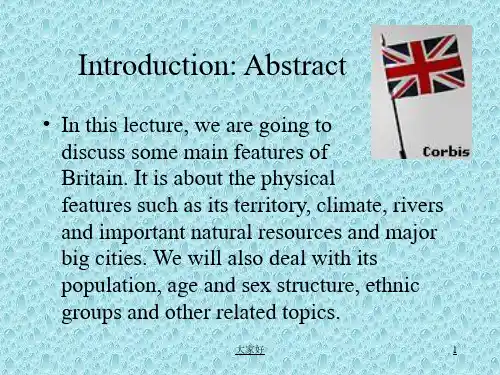
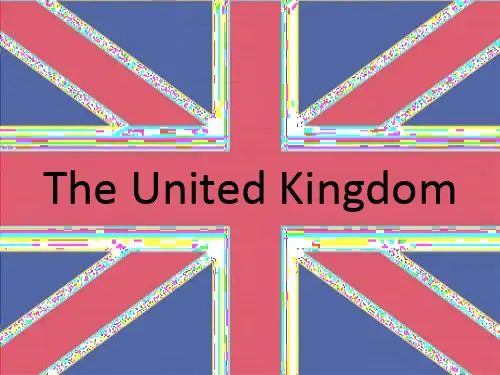
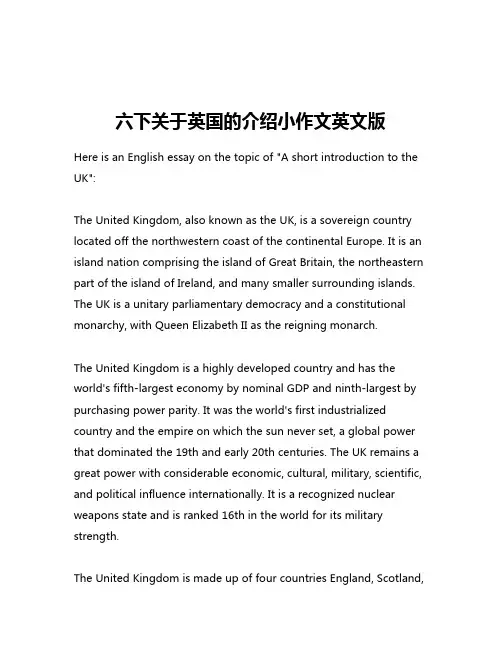
六下关于英国的介绍小作文英文版Here is an English essay on the topic of "A short introduction to the UK":The United Kingdom, also known as the UK, is a sovereign country located off the northwestern coast of the continental Europe. It is an island nation comprising the island of Great Britain, the northeastern part of the island of Ireland, and many smaller surrounding islands. The UK is a unitary parliamentary democracy and a constitutional monarchy, with Queen Elizabeth II as the reigning monarch.The United Kingdom is a highly developed country and has the world's fifth-largest economy by nominal GDP and ninth-largest by purchasing power parity. It was the world's first industrialized country and the empire on which the sun never set, a global power that dominated the 19th and early 20th centuries. The UK remains a great power with considerable economic, cultural, military, scientific, and political influence internationally. It is a recognized nuclear weapons state and is ranked 16th in the world for its military strength.The United Kingdom is made up of four countries England, Scotland,Wales, and Northern Ireland. England, the largest and most populous of the four, occupies the central and southern part of the island of Great Britain. Scotland, located in the northern part of Great Britain, is home to over 5 million people. Wales lies to the west of England and has a population of just over 3 million. Northern Ireland, the smallest of the four, is located on the island of Ireland and has a population of around 1.9 million.London, the capital and largest city of England and the UK, is a global center of finance, arts, media, entertainment, and tourism. It is one of the world's most visited cities. Other major cities in the UK include Birmingham, Manchester, Glasgow, Liverpool, Leeds, and Bristol. The UK has a diverse geography, ranging from the rugged highlands and islands of Scotland and Wales to the rolling hills and river valleys of England. It has a temperate maritime climate, with cool, wet winters and mild, wet summers.The United Kingdom has a long and storied history, having been home to many ancient civilizations and kingdoms over the centuries. The Romans, Anglo-Saxons, Normans, and Danes all left their mark on the islands. The Act of Union in 1707 joined the Kingdoms of England and Scotland, leading to the formation of the Kingdom of Great Britain. The Acts of Union in 1800 then added the Kingdom of Ireland, creating the United Kingdom of Great Britain and Ireland.The UK played a pivotal role in the development of parliamentary democracy and in the industrial revolution, which transformed the country into the world's first industrialized nation. It was also the center of the British Empire, which at its height encompassed around a quarter of the world's population and landmass. The UK's global influence and power began to decline in the 20th century, but it remains a major economic and political force today.The UK is renowned for its rich cultural heritage, including its literature, art, music, theater, and architecture. It has produced many of the world's most famous writers, artists, musicians, and thinkers. British culture has had a significant influence globally, particularly through the widespread use of the English language. The UK is also home to a diverse population, with people from all over the world making it their home.In conclusion, the United Kingdom is a fascinating and multifaceted country with a long and storied history, a vibrant culture, and a significant global influence. From its ancient castles and rolling countryside to its bustling cities and cutting-edge technology, the UK offers something for everyone. Whether you're interested in history, culture, nature, or just exploring a new and exciting destination, the UK is a country that is well worth discovering.。
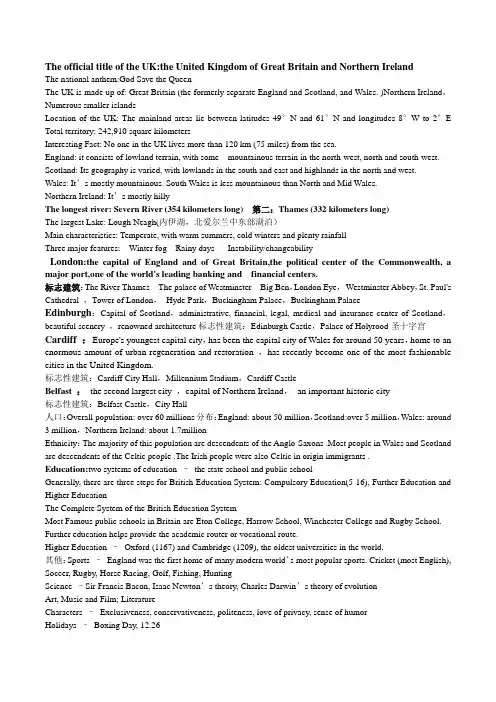
The official title of the UK:the United Kingdom of Great Britain and Northern IrelandThe national anthem:God Save the QueenThe UK is made up of: Great Britain (the formerly separate England and Scotland, and Wales. )Northern Ireland,Numerous smaller islandsLocation of the UK: The mainland areas lie between latitudes 49°N and 61°N and longitudes 8°W to 2°E Total territory: 242,910 square kilometersInteresting Fact: No one in the UK lives more than 120 km (75 miles) from the sea.England: it consists of lowland terrain, with some mountainous terrain in the north-west, north and south-west. Scotland: Its geography is varied, with lowlands in the south and east and highlands in the north and west. Wales: It’s mostly mountainous. South Wales is less mountainous than North and Mid Wales.Northern Ireland: It’s mostly hillyThe longest river: Severn River (354 kilometers long) 第二:Thames (332 kilometers long)The largest Lake: Lough Neagh(内伊湖,北爱尔兰中东部湖泊)Main characteristics: Temperate, with warm summers, cold winters and plenty rainfallThree major features: Winter fog Rainy days Instability/changeabilityLondon:the capital of England and of Great Britain,the political center of the Commonwealth, a major port,one of the world's leading banking and financial centers.标志建筑:The River Thames The palace of Westminster Big Ben,London Eye,Westminster Abbey,St. Paul's Cathedral ,Tower of London,Hyde Park,Buckingham Palace,Buckingham PalaceEdinburgh:Capital of Scotland,administrative, financial, legal, medical and insurance center of Scotland,beautiful scenery ,renowned architecture标志性建筑:Edinburgh Castle,Palace of Holyrood圣十字宫Cardiff :Europe's youngest capital city,has been the capital city of Wales for around 50 years,home to an enormous amount of urban regeneration and restoration ,has recently become one of the most fashionable cities in the United Kingdom.标志性建筑:Cardiff City Hall,Millennium Stadium,Cardiff CastleBelfast :the second largest city ,capital of Northern Ireland,an important historic city标志性建筑:Belfast Castle,City Hall人口:Overall population: over 60 millions分布:England: about 50 million,Scotland:over 5 million,Wales: around 3 million,Northern Ireland: about 1.7millionEthnicity:The majority of this population are descendents of the Anglo-Saxons .Most people in Wales and Scotland are descendents of the Celtic people .The Irish people were also Celtic in origin immigrants .Education:two systems of education –the state school and public schoolGenerally, there are three steps for British Education System: Compulsory Education(5-16), Further Education and Higher EducationThe Complete System of the British Education SystemMost Famous public schools in Britain are Eton College, Harrow School, Winchester College and Rugby School. Further education helps provide the academic router or vocational route.Higher Education –Oxford (1167) and Cambridge (1209), the oldest universities in the world.其他:Sports –England was the first home of many modern world’s most popular sports. Cricket (most English), Soccer, Rugby, Horse Racing, Golf, Fishing, HuntingScience –Sir Francis Bacon, Isaac Newton’s theory, Charles Darwin’s theory of evolutionArt, Music and Film; LiteratureCharacters –Exclusiveness, conservativeness, politeness, love of privacy, sense of humorHolidays –Boxing Day, 12.26Religion –mostly ChristianizedCustom:John Bull –image of an British, nickname for Britain. Short, fat, with a tall hat on his head and apair of boots of his feet.origin-十八世纪初,作家兼御医Dr. Arbuthnot写了一本《约翰牛传》(The History of John Bull),主张英、法和平相处,书中主角的名字就叫作John Bull,作者用他来代表英国。

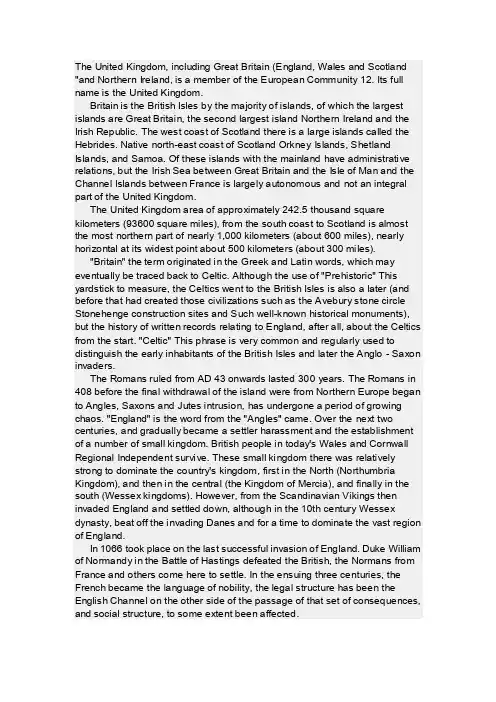
The United Kingdom, including Great Britain (England, Wales and Scotland "and Northern Ireland, is a member of the European Community 12. Its full name is the United Kingdom.Britain is the British Isles by the majority of islands, of which the largest islands are Great Britain, the second largest island Northern Ireland and the Irish Republic. The west coast of Scotland there is a large islands called the Hebrides. Native north-east coast of Scotland Orkney Islands, Shetland Islands, and Samoa. Of these islands with the mainland have administrative relations, but the Irish Sea between Great Britain and the Isle of Man and the Channel Islands between France is largely autonomous and not an integral part of the United Kingdom.The United Kingdom area of approximately 242.5 thousand square kilometers (93600 square miles), from the south coast to Scotland is almost the most northern part of nearly 1,000 kilometers (about 600 miles), nearly horizontal at its widest point about 500 kilometers (about 300 miles)."Britain" the term originated in the Greek and Latin words, which may eventually be traced back to Celtic. Although the use of "Prehistoric" This yardstick to measure, the Celtics went to the British Isles is also a later (and before that had created those civilizations such as the Avebury stone circle Stonehenge construction sites and Such well-known historical monuments), but the history of written records relating to England, after all, about the Celtics from the start. "Celtic" This phrase is very common and regularly used to distinguish the early inhabitants of the British Isles and later the Anglo - Saxon invaders.The Romans ruled from AD 43 onwards lasted 300 years. The Romans in 408 before the final withdrawal of the island were from Northern Europe began to Angles, Saxons and Jutes intrusion, has undergone a period of growing chaos. "England" is the word from the "Angles" came. Over the next two centuries, and gradually became a settler harassment and the establishment of a number of small kingdom. British people in today's Wales and Cornwall Regional Independent survive. These small kingdom there was relatively strong to dominate the country's kingdom, first in the North (Northumbria Kingdom), and then in the central (the Kingdom of Mercia), and finally in the south (Wessex kingdoms). However, from the Scandinavian Vikings then invaded England and settled down, although in the 10th century Wessex dynasty, beat off the invading Danes and for a time to dominate the vast region of England.In 1066 took place on the last successful invasion of England. Duke William of Normandy in the Battle of Hastings defeated the British, the Normans from France and others come here to settle. In the ensuing three centuries, the French became the language of nobility, the legal structure has been the English Channel on the other side of the passage of that set of consequences, and social structure, to some extent been affected.Wales, though often in England within the sphere of influence, but has been a bastion of Boston. However, in the Prince Llewellyn was killed in 1282, after Edward I waged a battle and victory to put England under the rule of Wales. Welsh nationalist sentiment continues to rise, the beginning of the 15th century rebellion led by Owen Gerlind illustrated this point. In 1536 and in 1542 a joint decree to England and Wales in the administrative, political and legal integration into one.Originally lived in Scotland most of Picts. The 6th century, the Scots from Ireland to settle in today's Argyll area. Lothian home to England, while others continue to go north Wales, Britain came to Strathclyde. The 9th century, the various regions of Scotland to unite against Viking. Throughout the Middle Ages, when England's monarchy has always been a powerful threat to Scotland's independence.England and Scotland, the joint that eventually, when the religious differences of the ethnic hatred in the past than the more crucial. In England, Elizabeth I in 1603 by James VI of Scotland (James I of England) to the throne. Even so, England and Scotland in addition to Oliver Cromwell's rule was once forced to bring together, in the 17th century they have been independe nt of each other. To 1707, aware of a closer political and economic union benefits, the two sides agreed to establish a single British Parliament. Scotland retained its own legal system and religious communities. But in George I and George II of Hanover, two Protestants during the reign of the royal family of England and Scotland, the relationship between the nervous and James II, has launched two rebellions revolutionaries to try to restore the Catholic House of Stuart.Ireland before the Christian era there were many of the Kingdom, but Ireland is not immune from a violation of Viking, to the 10th century AD, when, suddenly became a Viking pre-eminence.Henry II of England in 1169 to launch the invasion of Ireland. England Ji Pope Adrian IV, Henry II granted the powers of the supreme ruler, because he was anxious to make Irish church fully compliant Rome. Fell in most parts of Ireland, Anglo - Norman power and privilege in the hands, but in medieval England, almost no direct exercise of jurisdiction in this.Tudor monarchs of several interventions in Ireland tend to be much stronger. In the reign of Elizabeth I, the Irish rebels launched a series of battles. 'Resistance Movement, mainly concentrated in the northern province of Ulster, 1607, due to the failure of the resistance movement as well as leaders of the exodus of Ulster from Scotland and England into areas inhabited by immigrants.As the English Civil War (1642 ~ 1652), Ireland was attacked by a number of uprisings, but have been Cromwell suppressed. 1688 James II was spent dim after the war between England and Ireland is constantly. 18th century, most of them are fragile peace. 18 century, the British Government has made various efforts to seek stability. In 1782, the Irish Parliament (established in the Middle Ages) to obtain legislative autonomy; in the Constitution than withBritain the only major link is to the Royal Government. However, the Parliament represents just a small number of Anglo - Irish privileged class, Catholics were excluded. In 1798 an uprising took place, but without success;in 1801, Ireland and Great Britain combined into one.Although the 1916 uprising in Dublin, the national insurrection was crushed, but in the First World War-stage, a stream known as the Irish Republican Army guerrilla forces began military action against the British authorities. In 1920 the Government of Ireland Act passed to set up two local government councils,one based in Dublin and one in Belfast. The Act was implemented in 1921 in Northern Ireland, Ulster Province, nine counties have six received their own parliament, while still have seats in the British Parliament, and subject to the jurisdiction of the British Parliament the highest. However, the Irish Republican Army continues to fight for the South to win its independence from Britain inthe fight. In June 1921 after the signing of an armistice agreement, accordingto conclude in December the same year, the British - Irish Treaty the Irish Free State was established in 1949, the Free State became the Republic of Ireland.Channel Islands and the Isle of Man, although not belonging to the United Kingdom, but have a special relationship with the United Kingdom. Channel Islands during the 10th century and 11th century part of the Duchy of Normandy. Isle of Man has been nominally in 1266 prior to the exercise of sovereignty by Norway to the 1765 final was governed directly by the Government of the Kingdom. Today, the Channel Islands and the Isle of Man have their own legislative bodies and the legal system, where the British Government is responsible for defense and international relations.翻译:英国包括大不列颠(英格兰、威尔士和苏格兰〉和北爱尔兰,是欧洲共同体12个成员国之一。
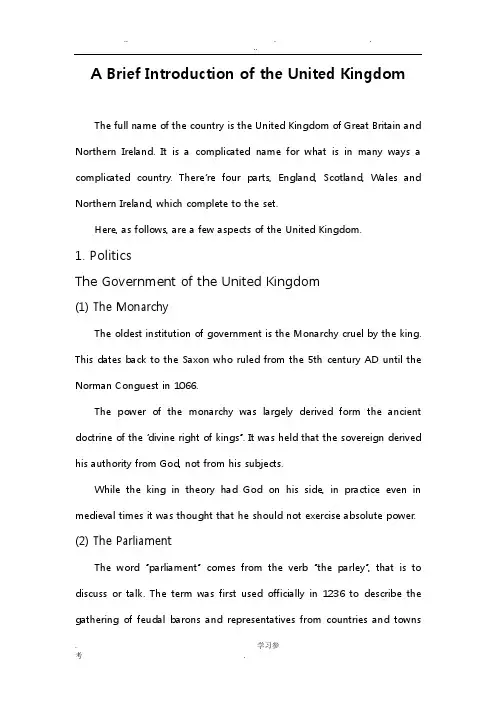
A Brief Introduction of the United KingdomThe full name of the country is the United Kingdom of Great Britain and Northern Ireland. It is a complicated name for what is in many ways a complicated country. There’re four parts, England, Scotland, Wales and Northern Ireland, which complete to the set.Here, as follows, are a few aspects of the United Kingdom.1. PoliticsThe Government of the United Kingdom(1) The MonarchyThe oldest institution of government is the Monarchy cruel by the king. This dates back to the Saxon who ruled from the 5th century AD until the Norman Conguest in 1066.The power of the monarchy was largely derived form the ancient doctrine of the ‘divine right of kings”. It was held that the sovereign derived his authority from God, not from his subjects.While the king in theory had God on his side, in practice even in medieval times it was thought that he should not exercise absolute power.(2) The ParliamentThe word “parliament”comes from the verb “the parley”, that is to discuss or talk. The term was first used officially in 1236 to describe the gathering of feudal barons and representatives from countries and townswhich the occasionally summoned if he wanted to raise money.The Great Council came to include both those who were summoned “by name” (the House of Lords) and representatives of communities (the House of Commons). These two houses exist today and collectively we call them the parliament. The Commons quickly gained in political strength. They were willing to help the king by raising taxes and passing laws, but in return they wanted an increasing say in what the king was doing.The parliament became the most powerful institute in Britain was after the Revolutional War.Parliament has a number of different functions. First and foremost, it passes laws. Another important function is that it provides the means of carrying on the work of government by voting for taxation. Its other roles are to scrutinize government policy, administration and expenditure and to debate the majority issues of the day.Parliament is supreme in the British state because it alone has the power to change the terms of the constitution.There are no legal restraints upon parliament. It can make or change laws. Change or overturn established conventions or even prolong its own life without consulting the electorate. However, it does not assert its supremacy, but bears the common law in mind and acts according to precedent..Each Parliament lasts for 5 years.The Upper house has no right to decide, it only has the right to pass thebills passed by the Lower House.The party which holds a majority of those “seats” in parliament forms the government, with its party leader as the Prime Minister. After a government has been in power for 5 years it has to resign and hold a “general election”, in which al British adults are give the chance to vote again for their constituency’s MP. A government cannot stand for longer than 5years except in exceptional circumstances. However, the Prime Minister can call an election sooner than 5years. This can happen when the government loses a “vote of no confidence” in the House of Commons. That is, an MP puts forward a statement for the MPs to vote on saying that “This house no longer ha confidence in the government.”(3) The Political PartiesThere are three major national parties: The conservative party and the Labour party are the two biggest, and any general election is really about which of those two is going to govern. But there’s a third important party, the Liberal Democrats, who usually receive up to about 20% of the votes: not enough to form a government, but enough to have a big impact on which of the other two parties does so.The Labour party is the newest of these three, created by the growing trade union movement at the end of nineteenth century. It quickly replaced the Laberal party as one of the two biggest parties. Labour is a socialist party. That is to say that they believe a society should be relatively equal ineconomic terms, and the part of the role of government is to act as a “redistributive” agent. The Conservative party is the party that spent most time in power, basically the Conservative are seen as the party of the individual, protecting the individual’s right to acquire wealth and to spend it how they choose , and so favouring economic policies which businessmen prefer, such as low taxes. They receive a lot of their party funding from big companies.2. Religion(1) Queen or king is the leader as well as the bishop of the High Church.(2) 20% of British citizen claims to be Roman Catholics.(3) 40% of Scotland citizen believe in Roman Catholic.(4) Two established churches: Church of London; Church of Scotland.(5) Roman Catholic churches.(6) Free Churches.3. CultureHere, I will emphasis on one aspect of Britain’s artistic output, that for which it is perhaps best known: Literature.⑴Early WritingMuch early British writing was concerned with Christianity: Anglo-Saxons produced beautifully illustrated versions of the Bible: the most famous of these is the book of keels, party written on the Scottish island of lona.⑵Elizabethan DramaThere was a general flowering of cultural and intellectual life in Europe during the 15th and 16th centuries which is known as “The Renaissance”, in British culture one of the most successful and long-lasting expressions of this development lay in drama.⑶18th –century English literature is marked by a rather largeshift from the mood and tone of 17th –century literature.⑷The Romantic PeriodRoughly the first third of the 19th century makes up English literature’s romantic period. Writers of romantic literature are more concerned with imagination and feeling than the power of reason, which marked the 18th century.⑸20th Century LiteratureThe 20th Century marked the end of the British Europe, which was replaced by the Commonwealth of Nations. Yet English civilization and culture continue to have a strong influence on the rest of the world. The heritage of English literature forms an outstanding part of that culture.20th Century literature can be broadly divided into two stylistic periods: Modernism, and Postmodernism. These periods roughly correspond to literature written after it. Both are characterized by a high degree of experimentation.4. EconomyNational economies can be broken down into three main areas: “primary”industries, such as agriculture, fishing and mining, “Secondary”industries, which manufacture complex goods from those primary products; and tertiary industries, often described as services, such as banking, insurance, tourism, and the selling of goods.Britain’s agricultural sector is small but efficient, producing 58% of the UK’s food needs with only 2% of its workforce. Three quarters of Britain’s land is used for agriculture, with about a quarter of that under crops-wheat and barley are the two commonest. The rest is grazing for animals.The fishing industry provides 55% of the UK demand for fish. Scottish ports land the majority of the fish caught.Energy production is an important part of the UK economy, accounting for 5% of the national wealth.In the secondary sector of the economy, manufacturing industry remains important, producing 22% of national wealth.The service sector of the United Kingdom is dominated by financial services, especially in banking and insurance. London is one of the world’s largest financial centers with the London Stock Exchange, the London international Financial Futures and Options Exchange, and the Lloyd’s of London insurance market all based in the city. It also has the largest concentration of foreign bank branches in the world.5.British diplomatic affairs(1)Britain’s foreign policies:The contemporary foreign policy of the UK is greatly influenced by its imperial history and also by its geopolitical traits. Perhaps the most important single factor which influences British policy-makers is its history.A second decisive influence upon the way Britain conducts its external affairs is geopolitical. Britain is an island state, and this is considered an important psychological factor as well as one which has influenced Britain’s economic and military development as a nation of seafarers who roamed the globe looking for territory and economic opportunities.How these foreign policies made:The general direction of Britain’s foreign policy is mainly decided by the Prime Minister and Cabinet. The main government department is of course the Foreign and Commonwealth Office, but many other government ministers also play a part in formulating and executing the government’s decisions.The Ministry of Defence is responsible for ensuring Britain’s defence and managing Britain’s involvement in its military treaty commitments. And the Department of Trade and Industry is for the international trade policy and British commercial relations with other countries.(2)Britain and International Institutions:Nowadays its foreign policy is largely shaped by its participation in a number of important international institutions.Britain is one of the five permanent members of the United Nations Security Council, along with Russia, China, the Us and France. It is also the sixth largest contributor to theUN’s budget. As a Security Council member, Britain retains the ability to have a large influence on world affairs. And the more important to Britain today in running of its affairs is its membership in the EU. Britain is also a member of the Commonwealth. Even though Britain granted its colonial territories independence, it continued to feel close to these new countries and wanted to continue to work with them.(3)Security and Defence Policy:Britain depends more on defence than most other advanced industrial countries and maintains larger professional forces. The keystone of British defence policy is its participation in NATO, which is commonly known as the North Atlantic Treaty Orgnasition. In addition to its NATO commitments, Britain retains an independent nuclear weapons capability but it is highly unlikely for it to use, or need to use the capability.。
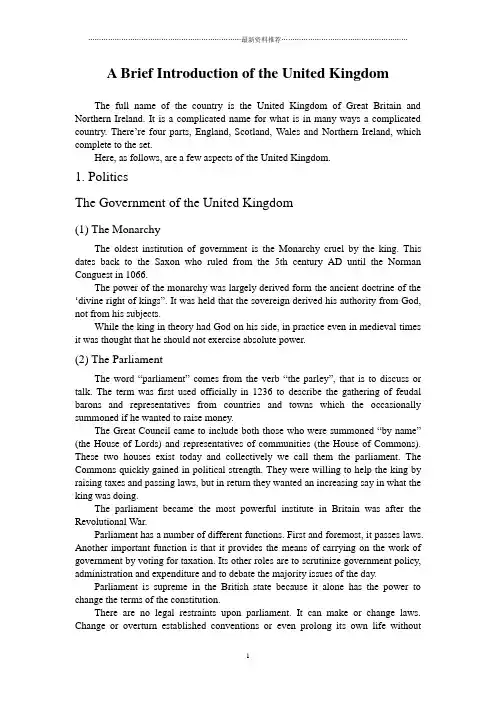
A Brief Introduction of the United KingdomThe full name of the country is the United Kingdom of Great Britain and Northern Ireland. It is a complicated name for what is in many ways a complicated country. There’re four parts, England, Scotland, Wales and Northern Ireland, which complete to the set.Here, as follows, are a few aspects of the United Kingdom.1. PoliticsThe Government of the United Kingdom(1) The MonarchyThe oldest institution of government is the Monarchy cruel by the king. This dates back to the Saxon who ruled from the 5th century AD until the Norman Conguest in 1066.The power of the monarchy was largely derived form the ancient doctrine of the ‘divine right of kings”. It was held that the sovereign derived his authority from God, not from his subjects.While the king in theory had God on his side, in practice even in medieval times it was thought that he should not exercise absolute power.(2) The ParliamentThe word “parliament”comes from the verb “the parley”, that is to discuss or talk. The term was first used officially in 1236 to describe the gathering of feudal barons and representatives from countries and towns which the occasionally summoned if he wanted to raise money.The Great Council came to include both those who were summoned “by name”(the House of Lords) and representatives of communities (the House of Commons). These two houses exist today and collectively we call them the parliament. The Commons quickly gained in political strength. They were willing to help the king by raising taxes and passing laws, but in return they wanted an increasing say in what the king was doing.The parliament became the most powerful institute in Britain was after the Revolutional War.Parliament has a number of different functions. First and foremost, it passes laws. Another important function is that it provides the means of carrying on the work of government by voting for taxation. Its other roles are to scrutinize government policy, administration and expenditure and to debate the majority issues of the day.Parliament is supreme in the British state because it alone has the power to change the terms of the constitution.There are no legal restraints upon parliament. It can make or change laws. Change or overturn established conventions or even prolong its own life withoutconsulting the electorate. However, it does not assert its supremacy, but bears the common law in mind and acts according to precedent..Each Parliament lasts for 5 years.The Upper house has no right to decide, it only has the right to pass the bills passed by the Lower House.The party which holds a majority of those “seats”in parliament forms the government, with its party leader as the Prime Minister. After a government has been in power for 5 years it has to resign and hold a “general election”, in which al British adults are give the chance to vote again for their constituency’s MP. A government cannot stand for longer than 5years except in exceptional circumstances. However, the Prime Minister can call an election sooner than 5years. This can happen when the government loses a “vote of no confidence” in the House of Commons. That is, an MP puts forward a statement for the MPs to vote on saying that “This house no longer ha confidence in the government.”(3) The Political PartiesThere are three major national parties: The conservative party and the Labour party are the two biggest, and any general election is really about which of those two is going to govern. But there’s a third important party, the Liberal Democrats, who usually receive up to about 20% of the votes: not enough to form a government, but enough to have a big impact on which of the other two parties does so.The Labour party is the newest of these three, created by the growing trade union movement at the end of nineteenth century. It quickly replaced the Laberal party as one of the two biggest parties. Labour is a socialist party. That is to say that they believe a society should be relatively equal in economic terms, and the part of the role of government is to act as a “redistributive” agent. The Conservative party is the party that spent most time in power, basically the Conservative are seen as the party of the individual, protecting the individual’s right to acquire wealth and to spend it how they choose , and so favouring economic policies which businessmen prefer, such as low taxes. They receive a lot of their party funding from big companies.2. Religion(1) Queen or king is the leader as well as the bishop of the High Church.(2) 20% of British citizen claims to be Roman Catholics.(3) 40% of Scotland citizen believe in Roman Catholic.(4) Two established churches: Church of London; Church of Scotland.(5) Roman Catholic churches.(6) Free Churches.3. CultureHere, I will emphasis on one aspect of Britain’s artistic output, that for which it is perhaps best known: Literature.⑴Early WritingMuch early British writing was concerned with Christianity: Anglo-Saxons produced beautifully illustrated versions of the Bible: the most famous of these is the book of keels, party written on the Scottish island of lona.⑵Elizabethan DramaThere was a general flowering of cultural and intellectual life in Europe during the 15th and 16th centuries which is known as “The Renaissance”, in British culture one of the most successful and long-lasting expressions of this development lay in drama.⑶18th –century English literature is marked by a rather large shiftfrom the mood and tone of 17th –century literature.⑷The Romantic PeriodRoughly the first third of the 19th century makes up English literature’s romantic period. Writers of romantic literature are more concerned with imagination and feeling than the power of reason, which marked the 18th century.⑸20th Century LiteratureThe 20th Century marked the end of the British Europe, which was replaced by the Commonwealth of Nations. Yet English civilization and culture continue to have a strong influence on the rest of the world. The heritage of English literature forms an outstanding part of that culture.20th Century literature can be broadly divided into two stylistic periods: Modernism, and Postmodernism. These periods roughly correspond to literature written after it. Both are characterized by a high degree of experimentation.4. EconomyNational economies can be broken down into three main areas: “primary”industries, such as agriculture, fishing and mining, “Secondary”industries, which manufacture complex goods from those primary products; and tertiary industries, often described as services, such as banking, insurance, tourism, and the selling of goods.Britain’s agricultural sector is small but efficient, producing 58% of the UK’s food needs with only 2% of its workforce. Three quarters of Britain’s land is used for agriculture, with about a quarter of that under crops-wheat and barley are the two commonest. The rest is grazing for animals.The fishing industry provides 55% of the UK demand for fish. Scottish ports land the majority of the fish caught.Energy production is an important part of the UK economy, accounting for 5% of the national wealth.In the secondary sector of the economy, manufacturing industry remains important, producing 22% of national wealth.The service sector of the United Kingdom is dominated by financial services, especially in banking and insurance. London is one of the world’s largest financial centers with the London Stock Exchange, the London international Financial Futures and Options Exchange, and the Lloyd’s of London insurance market all based in the city. It also has the largest concentration of foreign bank branches in the world. 5.British diplomatic affairs(1)Britain’s foreign policies:The contemporary foreign policy of the UK is greatly influenced by its imperial history and also by its geopolitical traits. Perhaps the most important single factor which influences British policy-makers is its history.A second decisive influence upon the way Britain conducts its external affairs is geopolitical. Britain is an island state, and this is considered an important psychological factor as well as one which has influenced Britain’s economic and military development as a nation of seafarers who roamed the globe looking for territory and economic opportunities.How these foreign policies made:The general direction of Britain’s foreign policy is mainly decided by the Prime Minister and Cabinet. The main government department is of course the Foreign and Commonwealth Office, but many other government ministers also play a part in formulating and executing the government’s decisions.The Ministry of Defence is responsible for ensuring Britain’s defence and managing Britain’s involvement in its military treaty commitments. And the Department of Trade and Industry is for the international trade policy and British commercial relations with other countries.(2)Britain and International Institutions:Nowadays its foreign policy is largely shaped by its participation in a number of important international institutions.Britain is one of the five permanent members of the United Nations Security Council, along with Russia, China, the Us and France. It is also the sixth largest contributor to the UN’s budget. As a Security Council member, Britain retains the ability to have a large influence on world affairs. And the more important to Britain today in running of its affairs is its membership in the EU. Britain is also a member of the Commonwealth. Even though Britain granted its colonial territories independence, it continued to feel close to these new countries and wanted to continue to work with them.(3)Security and Defence Policy:Britain depends more on defence than most other advanced industrial countries and maintains larger professional forces. The keystone of British defence policy is its participation in NATO, which is commonly known as the North Atlantic Treaty Orgnasition. In addition to its NATO commitments, Britain retains an independent nuclear weapons capability but it is highly unlikely for it to use, or need to use the capability.。
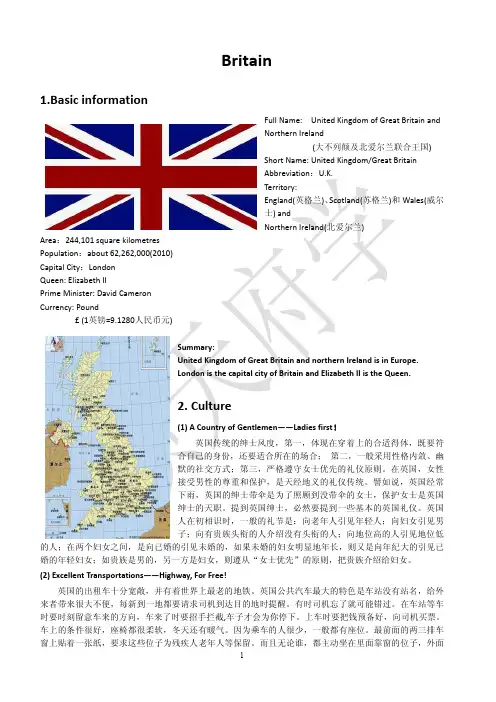
Britain1.Basic informationFull Name:United Kingdom of Great Britain andNorthern Ireland(大不列颠及北爱尔兰联合王国)Short Name:United Kingdom/Great BritainAbbreviation:U.K.Territory:England(英格兰)、Scotland(苏格兰)和Wales(威尔士)andNorthern Ireland(北爱尔兰)Area:244,101square kilometresPopulation:about62,262,000(2010)Capital City:LondonQueen:Elizabeth IIPrime Minister:David CameronCurrency:Pound£(1英镑=9.1280人民币元)Summary:United Kingdom of Great Britain and northern Ireland is in Europe.London is the capital city of Britain and Elizabeth II is the Queen.2.Culture(1)A Country of Gentlemen——Ladies first!英国传统的绅士风度,第一,体现在穿着上的合适得体,既要符合自己的身份,还要适合所在的场合;第二,一般采用性格内敛、幽默的社交方式;第三,严格遵守女士优先的礼仪原则。
在英国,女性接受男性的尊重和保护,是天经地义的礼仪传统。
譬如说,英国经常下雨,英国的绅士带伞是为了照顾到没带伞的女士,保护女士是英国绅士的天职。
提到英国绅士,必然要提到一些基本的英国礼仪。
英国人在初相识时,一般的礼节是:向老年人引见年轻人;向妇女引见男子;向有贵族头衔的人介绍没有头衔的人;向地位高的人引见地位低的人;在两个妇女之间,是向已婚的引见未婚的,如果未婚的妇女明显地年长,则又是向年纪大的引见已婚的年轻妇女;如贵族是男的,另一方是妇女,则遵从“女士优先”的原则,把贵族介绍给妇女。
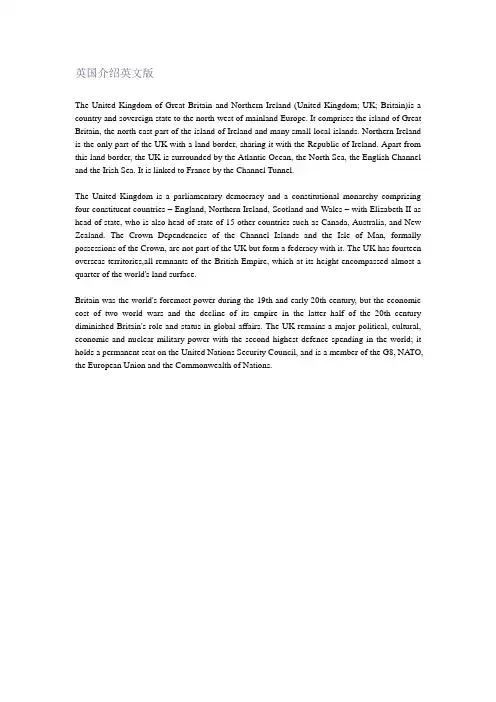
英国介绍英文版The United Kingdom of Great Britain and Northern Ireland (United Kingdom; UK; Britain)is a country and sovereign state to the north-west of mainland Europe. It comprises the island of Great Britain, the north-east part of the island of Ireland and many small local islands. Northern Ireland is the only part of the UK with a land border, sharing it with the Republic of Ireland. Apart from this land border, the UK is surrounded by the Atlantic Ocean, the North Sea, the English Channel and the Irish Sea. It is linked to France by the Channel Tunnel.The United Kingdom is a parliamentary democracy and a constitutional monarchy comprising four constituent countries – England, Northern Ireland, Scotland and Wales – with Elizabeth II as head of state, who is also head of state of 15 other countries such as Canada, Australia, and New Zealand. The Crown Dependencies of the Channel Islands and the Isle of Man, formally possessions of the Crown, are not part of the UK but form a federacy with it. The UK has fourteen overseas territories,all remnants of the British Empire, which at its height encompassed almost a quarter of the world's land surface.Britain was the world's foremost power during the 19th and early 20th century, but the economic cost of two world wars and the decline of its empire in the latter half of the 20th century diminished Britain's role and status in global affairs. The UK remains a major political, cultural, economic and nuclear military power with the second highest defence spending in the world; it holds a permanent seat on the United Nations Security Council, and is a member of the G8, NATO, the European Union and the Commonwealth of Nations.。
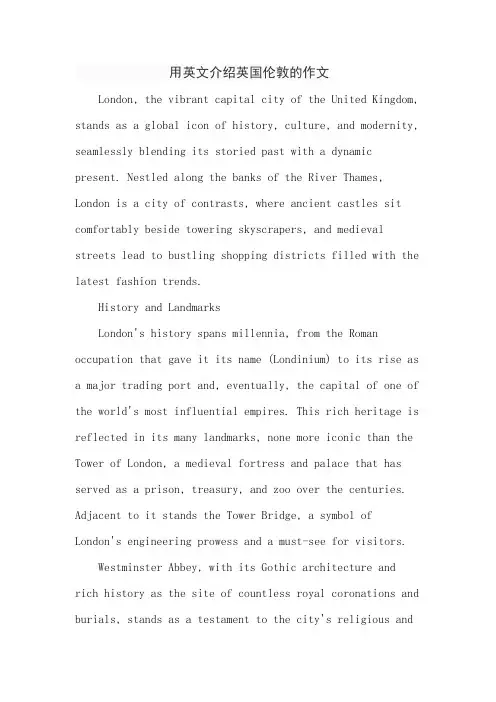
用英文介绍英国伦敦的作文London, the vibrant capital city of the United Kingdom, stands as a global icon of history, culture, and modernity, seamlessly blending its storied past with a dynamic present. Nestled along the banks of the River Thames, London is a city of contrasts, where ancient castles sit comfortably beside towering skyscrapers, and medieval streets lead to bustling shopping districts filled with the latest fashion trends.History and LandmarksLondon's history spans millennia, from the Roman occupation that gave it its name (Londinium) to its rise as a major trading port and, eventually, the capital of one of the world's most influential empires. This rich heritage is reflected in its many landmarks, none more iconic than the Tower of London, a medieval fortress and palace that has served as a prison, treasury, and zoo over the centuries. Adjacent to it stands the Tower Bridge, a symbol ofLondon's engineering prowess and a must-see for visitors.Westminster Abbey, with its Gothic architecture andrich history as the site of countless royal coronations and burials, stands as a testament to the city's religious andpolitical significance. Nearby, Big Ben and the Houses of Parliament dominate the skyline, their iconic clock tower chiming out the hours for all of London to hear.Culture and ArtsLondon is a cultural melting pot, home to world-class museums, galleries, and theaters. The British Museum, with its vast collection spanning ancient Egypt to modern art, is a treasure trove of human history. The National Gallery and Tate Modern offer a feast for art lovers, showcasing masterpieces from the likes of Leonardo da Vinci, Vincent van Gogh, and contemporary artists alike.The West End is the heart of London's theater district, where classic plays and cutting-edge musicals like "LesMisérables" and "The Phantom of the Opera" continue to captivate audiences night after night. The Royal Opera House and the Royal Albert Hall are equally renowned for their performances of ballet, opera, and classical music.Cuisine and NightlifeLondon's culinary scene is as diverse as its population, offering everything from traditional English dishes like fish and chips and roast beef to international cuisines from every corner of the globe. Street foodmarkets like Camden and Borough Market are vibrant hubs of flavor, where visitors can sample everything from gourmet burgers to exotic street eats.The city's nightlife is legendary, with Shoreditch and Soho being particularly popular destinations for club-goers and bar-hoppers. From cozy cocktail bars to cavernous nightclubs, London offers endless options for those who want to dance the night away or simply unwind with a drink.Modernity and InnovationDespite its deep historical roots, London is also acity of innovation and progress. The City of London, the financial district, is a global hub for banking, finance, and technology, with towering skyscrapers like the Gherkin and the Shard symbolizing the city's modern aspirations. Startups and tech giants alike thrive in the vibrant tech ecosystem of East London, particularly in Shoreditch and Old Street (known as "Silicon Roundabout").In conclusion, London is a city that never fails to impress, offering visitors a unique blend of history, culture, art, cuisine, and modernity. Whether you're strolling along the South Bank, exploring the winding streets of Notting Hill, or admiring the view from the topof the Shard, London has something for everyone. It is truly a city that never sleeps, always evolving, and forever captivating.。
BritainChapter OneGeography. People and LanguageNew Words & Phrases.temperate 温带、和的precipitation 降雨量latitude 纬度immigrant 移民colony 殖民地diverse 多样化的Germanic 日尔曼语系的evolve 演变,发展Vikings 北欧海盗codify 编簨,系统化undocumented 无文件记载的subsequently 随后的barbarian 野蛮人division 部分,分界线husbandary 饲养业missionary 传教士monastery 修道院I.Geography1.full name: the United Kindom of Great Britain and Northen Lreland.2.Location: the U.K locates to the northwest of mainland Europe,an island countrysurrounded by sea,It lies in the North Atlantic Ocean.3.Area: 242.910 square kilometersposition: British Isles5.Political division: England, Scotland, Wales, Northen Island6.Mountain: Ben Nevis (本尼维斯),1st 1343m7.River: Seven River (塞文河),1st ,338km (in Wales)Thames River(in England), 2nd ,336kmke: Lough Neagh(内湖),1st ,338km(in Northern Ireland)9.climate:a maritime climateplentiful preciperationfoggy,rainy, instablility10:Major Cities:1st :London,capital2nd :Birmingham(伯明翰)3rd :Leeds(利兹)II.People1.Race:the English 81.5%The Scottish 9.6%The Irish 1.9%The North Irish 7%2.Population: 60 million (a 2005 estimate)3.Religion: Christianitynguage: English is a member of the Indo-European family of language. It is in the Germanic group of this family.1.PeriodsOld English(5th -1150)The Angles,Saxons and Jutes drove the Celtic-speaking people out of what is now England into Scotland,Wales, and the Ireland in the 5th and 6th century, they used the language of northeastern regien of the Netherland—that is now called Old English.Middle English(1150-1550)In 1066, William, the Conqueror invaded and conquered England, they used French as the official language,so many French words came into English vocabulary. English day by day evolved into what is now referred to as Middle English.Modern English(1550-now)In 1467, The printing press was introduced by William Caxton,who brought standardization to English, the dialect of London became the standard. Spelling and grammar became fixed.2.Standard EnglishIt is based on the speech of the upper class of southeastern England, adopted as a broadcasting standard in the British media.It is used as much in printed material and is normally taught in schools and to non –native speakers learning language. It is called Queen’s English or BBC English. At present, nearly a quarter of the world’s population use English. It has became a universal linguia francaChapter Two HistoryNew words and Phrasespious 虔诚的coronation 加冕feudalism 封建制度charter 宪章constitution 宪法provision 条款parliament 议会monarchy 君主制度Puritan 清教徒dominion 领土,统治权retake 收回originate 发源maritime 海上的,靠海的norm 准则dialect 方言,地方话Christianity 基督教the British Isles 不列颠群岛Guildhall 市政厅St.Paul’s Cathedral 圣保罗大教堂Indo-European family of language 印欧语系Northen Ireland 北爱尔兰I.The Origin of the Nation (55BC-1066AC)国家的起源史前史:巨石阵:In 2500BC,TheBeaker folk(比克人) invaded the British islands,they built the Stonshenge in 1800BC-1400BC。
英国国家概况(一)(中英文版)第一章英国的国土与人民第一章Land and People英国的国土与人民I. Different Names for Britain and its Parts英国的不同名称及其各组成部分1.Geographical names: the British Isles, Great Britain and England.地理名称:不列颠群岛,大不列颠和英格兰。
2.Official name: the United Kingdom of Great Britain and Northern Ireland.官方正式名称:大不列颠及北爱尔兰联合王国。
3.The British Isles are made up of two large islands-Great Britain (the larger one) and Ireland, and hundreds of small ones.不列颠群岛由两个大岛-大不列颠岛(较大的一个)和爱尔兰岛,及成千上万个小岛组成。
4.Three political divisions on the island of Great Britain: England, Scotland and Wales.大不列颠岛上有三个政治区:英格兰、苏格兰和威尔士。
(1) England is in the southern part of Great Britain. It is the largest, most populous section.英格兰位于大不列颠岛南部,是最大,人口最稠密的地区。
(2) Scotland is in the north of Great Britain. It has three natural zones (the Highlands in the north; the Central lowlands; the south Uplands) Capital: Edinburgh苏格兰位于大不列颠的北部。
英国介绍英文版作文英文回答:Introduction to the United Kingdom。
The United Kingdom, also known as Britain, is a sovereign island nation located in northwestern Europe. It comprises England, Wales, Scotland, and Northern Ireland. The UK has a rich history, a vibrant culture, and a global influence.Geography and Climate。
The UK is bordered by the North Sea to the east, the English Channel to the south, and the Celtic Sea to the west. The country has a diverse landscape, including rolling hills, mountains, and coastline. The climate is temperate, with mild winters and warm summers.History。
The history of the UK dates back thousands of years, with evidence of human habitation from prehistoric times. The Romans invaded the region in the 1st century AD, and the country was later ruled by various groups, including the Saxons, Vikings, and Normans. The United Kingdom of Great Britain and Ireland was formed in 1801, and the Republic of Ireland seceded in 1922.Politics and Government。
六下关于英国的介绍小作文英文版全文共3篇示例,供读者参考篇1【Introduction of England】England, located in the southern part of Great Britain, is a country with a rich history, diverse culture, and stunning landscapes. Known for its iconic landmarks, historic cities, and charming countryside, England is a popular destination for tourists from around the world.One of the most famous landmarks in England is the Big Ben, an iconic clock tower located in London. The tower is part of the Palace of Westminster, which is the seat of the UK Parliament. Visitors can take guided tours of the palace and even attend parliamentary debates.Another must-visit destination in England is Stonehenge, a prehistoric monument located in Wiltshire. This ancient site is shrouded in mystery, with many theories about its purpose and construction. Visitors can explore the site and learn about its history at the nearby visitor center.England is also home to several historic cities, such as Oxford, Cambridge, and Bath. These cities are famous for their picturesque architecture, world-class universities, and rich cultural heritage. Visitors can take walking tours of the city centers, visit museums and galleries, and enjoy traditional English pub food.For nature lovers, England offers a variety of stunning landscapes, including the Lake District, the Peak District, and the Cotswolds. These national parks are perfect for hiking, biking, and wildlife spotting. Visitors can also explore the scenic coastline, with its sandy beaches, rugged cliffs, and picturesque villages.In addition to its natural beauty and historic sites, England is known for its vibrant cultural scene. The country is home to world-class museums, theaters, and art galleries, as well as music festivals, literary events, and sporting competitions. Visitors can immerse themselves in English culture by attending a play at the Globe Theatre, exploring the British Museum, or attending a football match at one of the country's many stadiums.Overall, England is a fascinating country with something to offer every type of traveler. Whether you're interested in history, culture, nature, or food, you're sure to find something thatcaptivates you in this diverse and vibrant country. So pack your bags and start exploring all that England has to offer!篇2Britain, also known as the United Kingdom, is a country located off the northwestern coast of mainland Europe. It consists of four constituent countries: England, Scotland, Wales, and Northern Ireland. The capital city is London, which is also the largest city in the country.Britain has a rich history dating back thousands of years. It was once the center of the powerful British Empire, which at its peak ruled over a quarter of the world's population and territory. This legacy is still evident today in the country's global influence, particularly in areas such as politics, culture, and language.One of the most iconic symbols of Britain is the Royal Family, which has been a central part of the country's identity for centuries. Queen Elizabeth II is the current monarch, and the royal family continues to play a significant role in British society.In terms of geography, Britain is known for its diverse landscapes, from rolling countryside and rugged mountains to bustling cities and picturesque seaside towns. The country'sclimate is temperate, with mild summers and cool, often damp winters.Britain is a multicultural society, with a rich tapestry of different cultures and traditions. This diversity is reflected in the country's cuisine, which includes dishes from around the world, as well as in its vibrant arts and entertainment scene.The country is also known for its strong economy, with key industries including finance, manufacturing, and technology. London is a major financial hub, and attracts businesses from around the world.Overall, Britain is a fascinating and dynamic country with a wealth of history, culture, and natural beauty to explore. Whether you're interested in exploring historic sites, enjoying the vibrant nightlife of London, or simply relaxing in the countryside, there's something for everyone in this diverse and vibrant country.篇3Introduction to EnglandEngland is a country that is part of the United Kingdom in Europe. It is surrounded by Scotland to the north, Wales to the west, the Atlantic Ocean to the northwest, the North Sea to theeast, and the English Channel to the south. With a population of over 56 million people, England is the largest country in the United Kingdom and is known for its rich history, iconic landmarks, and diverse culture.One of the most famous landmarks in England is the city of London, which is the capital of both England and the United Kingdom. London is a bustling metropolis that is home to famous sites such as the Tower of London, Buckingham Palace, and Big Ben. It is also a hub for culture, with world-class museums, theaters, and art galleries to explore.In addition to London, England is also known for its picturesque countryside, charming villages, and historic cities. The countryside of England is dotted with rolling hills, lush green fields, and quaint villages, making it a popular destination for outdoor enthusiasts and nature lovers. The city of Oxford, known for its prestigious university and stunning architecture, is another must-visit destination in England.England is also famous for its rich history, which can be seen in its many historic buildings, castles, and palaces. One of the most iconic landmarks in England is Stonehenge, a prehistoric monument that dates back thousands of years. Visitors can explore this mysterious site and learn about its ancient origins.The culture of England is diverse and vibrant, with influences from around the world. From traditional English pubs serving fish and chips to multicultural restaurants offering cuisine from all corners of the globe, England is a melting pot of different cultures and traditions. The arts scene in England is also thriving, with world-renowned theaters, music venues, and art galleries showcasing the best of British talent.In conclusion, England is a country that is rich in history, culture, and natural beauty. From the bustling streets of London to the tranquil countryside, there is something for everyone to enjoy in this fascinating country. Whether you are interested in history, art, food, or nature, England has something to offer every visitor. Come and explore all that England has to offer and discover the magic of this enchanting country.。
英国英文简介作文London is a vibrant and diverse city, filled with history and culture. From the iconic landmarks like Big Ben and the Tower Bridge to the bustling markets of Camden and Borough, there is never a dull moment in this bustling metropolis.The British countryside is a picturesque escape from the hustle and bustle of city life. Rolling hills, quaint villages, and charming pubs await those who venture outside of the urban centers. Whether you're exploring the rugged coastlines of Cornwall or hiking in the Lake District, there is no shortage of natural beauty to discover.British cuisine may not have the best reputation, but there are plenty of delicious dishes to try. Fromtraditional favorites like fish and chips and roast beef with Yorkshire pudding to more modern fare like Indian curry and gourmet burgers, there is something to satisfy every palate.The British are known for their love of tea, and afternoon tea is a beloved tradition in the UK. Scones with clotted cream and jam, finger sandwiches, and delicate pastries are served alongside a pot of hot tea, creating a perfect afternoon indulgence.The British sense of humor is legendary, with dry wit and sarcasm being common forms of expression. From Monty Python to The Office, British comedy has a long history of entertaining audiences with its clever and often absurd humor.The Royal Family is a source of fascination for many people around the world. From royal weddings to public appearances, the British monarchy continues to captivate audiences with its traditions and ceremonies. Whetheryou're a fan of the Queen or a critic of the institution, there is no denying the impact that the Royal Family has on British culture.。